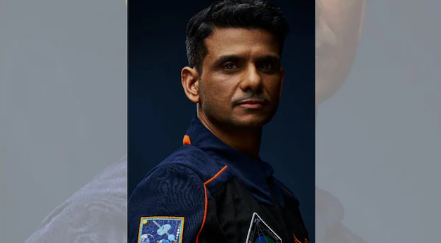Shubhanshu Shukla, who has spent the last eight months training with NASA and Axiom Space, will fly to the International Space Station on a privately funded commercial mission.

Marking a significant milestone in India’s space journey, the Centre has announced that Group Captain Shubhanshu Shukla, a Gaganyatri or astronaut-designate, is scheduled to fly to the International Space Station next month.
Union Minister for Space and Technology Dr Jitendra Singh said, “The International space mission carrying an Indian astronaut is scheduled for next month. India is poised to script a defining chapter in its space journey. An Indian astronaut is set for a historic space mission as ISRO charts bold new frontiers. India’s space dreams are soaring higher with Gaganyaan preparations, ISS mission, and a summer of launches.”
Group Captain Shubhanshu Shukla, who has spent the last eight months training with NASA and Axiom Space, will fly to the International Space Station on a privately funded commercial mission. India has reportedly paid over $60 million for the mission, which will launch on a SpaceX Falcon 9 rocket with a SpaceX Crew Dragon capsule carrying a four-person crew, lifting off from Florida’s Kennedy Space Centre.
Who is Group Captain Shubhanshu Shukla?
Group Captain Shubhanshu Shukla is 40 years old, the youngest of the Indian Space Research Organisation (ISRO) astronauts. The space centre has chosen Shukla for this mission as he has a long career ahead of him.
The commander of the Axiom-4 (Ax-4) mission will be former NASA astronaut Peggy Whitson, who now works for Axiom Space. The other two crew members are Slawosz Uznanski from Poland, who is a European Space Agency astronaut and will be a mission specialist, and Hungary’s Tibor Kapu, who will also have the same role. Group Captain Shukla will be the mission’s pilot.
Significance of Axiom-4 Mission
Union Minister Singh said the mission will make Group Captain Shubhanshu Shukla the first Indian astronaut to visit the International Space Station and the first Indian in space in over four decades, following Rakesh Sharma’s historic 1984 flight on a Soviet Soyuz spacecraft.
Dr V Narayanan, Secretary, Department of Space and Chairman of ISRO, said that Group Captain Shubhanshu Shukla of the Indian Air Force is prepared for the mission.
Group Captain Shukla’s mission represents a confident and forward-thinking India, poised to reclaim its position in the global space race. His journey is more than just a flight – it’s a signal that India is stepping boldly into a new era of space exploration.
A decorated test pilot with the Indian Air Force, Group Captain Shukla was selected for ISRO’s Human Spaceflight Program. He’s a top contender for India’s Gaganyaan mission, India’s first indigenous crewed orbital flight. His journey aboard the Ax-4 mission is expected to provide critical hands-on experience in spaceflight operations, launch protocols, microgravity adaptation, and emergency preparedness – all essential for India’s crewed space ambitions.
Group Captain Shukla’s mission is strategically significant as it focuses on operational readiness and global integration, marking a shift from earlier symbolic endeavours. It highlights India’s growing involvement in international public-private partnerships in space and its resolve to emerge as a serious contender in human space exploration.
Underscoring the significance of the upcoming human spaceflight and a series of critical ISRO missions, Singh said, “India is ready for its next space milestone.” He noted that the collaboration with international partners and the strategic momentum of projects like Gaganyaan reflect India’s commitment to becoming a global leader in space technology. The minister emphasised that these efforts are not only scientific but also aligned with the vision of a developed and self-reliant India.
ISRO is set to launch the PSLV-C61 mission, carrying the EOS-09 satellite, which features a C-band synthetic aperture radar for high-resolution Earth imaging, under all weather conditions, day or night.







